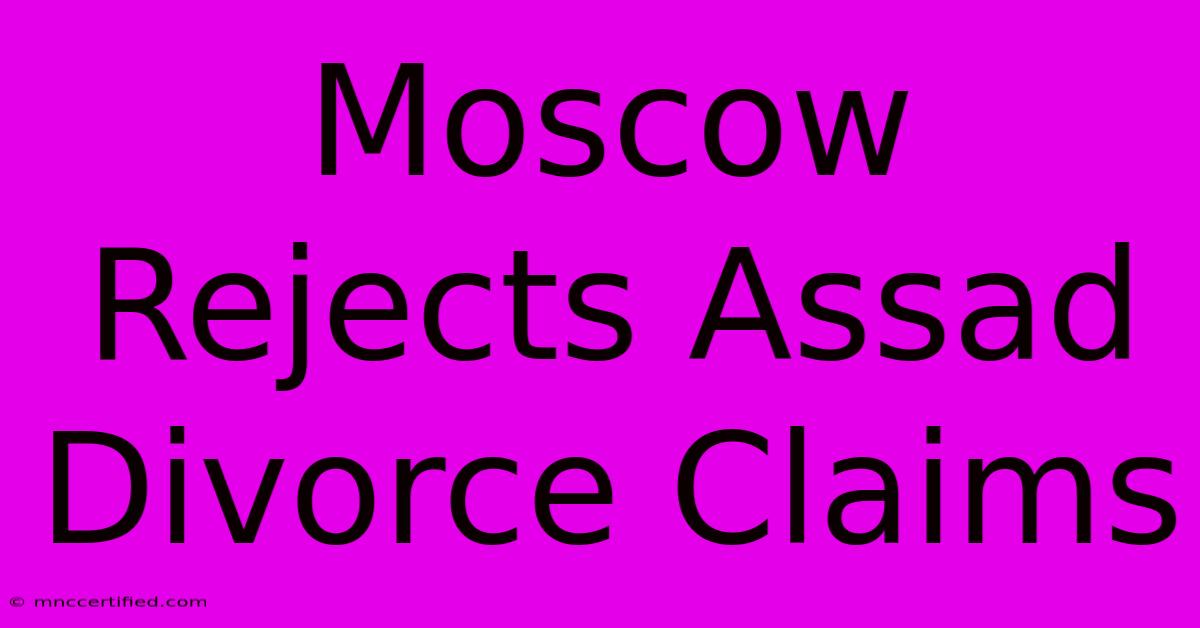Moscow Rejects Assad Divorce Claims

Table of Contents
Moscow Rejects Assad Divorce Claims: A Deep Dive into Syria's Shifting Alliances
The recent swirl of speculation regarding a potential shift in Russia's relationship with Syrian President Bashar al-Assad has been met with a firm denial from Moscow. Claims of a fracturing alliance, often fueled by Assad's increasingly authoritarian rule and Russia's evolving geopolitical strategies, have been categorically rejected by Russian officials. This article delves into the intricacies of this crucial relationship, examining the factors fueling these rumors and analyzing the long-term implications for Syria and the broader Middle East.
Understanding the Alleged "Divorce" Narrative
The narrative suggesting a rift between Russia and Assad often centers on several key points: human rights concerns, economic pressures, and shifting regional dynamics. Critics point to Assad's brutal crackdown on dissent, the ongoing humanitarian crisis, and his continued reliance on Iranian backing as potential sources of friction with Russia. Some analysts speculate that Russia, facing increasing economic strain due to the war in Ukraine, may be reevaluating its substantial investment in Syria.
Human Rights Concerns and International Pressure
Russia's commitment to Assad has faced increasing scrutiny from international human rights organizations and Western governments. The Assad regime's well-documented human rights abuses, including the use of chemical weapons and the systematic targeting of civilians, have drawn condemnation globally. This international pressure, coupled with growing domestic discontent within Syria itself, potentially places strain on Russia's strategic partnership with Damascus. However, Russia consistently deflects such criticism, highlighting its role in stabilizing Syria and combating terrorism.
Economic Strain and Shifting Priorities
The ongoing war in Ukraine has significantly impacted Russia's economy, leading some observers to suggest a potential reassessment of its commitments abroad. Maintaining its military presence and providing economic support to Syria represents a considerable financial burden. However, it's crucial to note that Russia's investment in Syria goes beyond mere financial aid; it also encompasses strategic geopolitical gains, including access to the Mediterranean and influence in the region.
Regional Geopolitics and Competing Interests
The complex web of regional alliances further complicates the Russia-Syria relationship. Iran's significant influence in Syria, often perceived as a rival to Russia's interests, fuels speculation about potential tensions. Furthermore, the involvement of other regional players, such as Turkey and Israel, adds layers of complexity to the situation. The shifting power dynamics within the region can influence Russia's strategic calculus and potentially lead to a recalibration of its Syria policy.
Moscow's Firm Rebuttal and Continued Support
Despite the swirling speculation, Russia has consistently and emphatically denied any intention of abandoning Assad. Official statements from the Kremlin and high-ranking Russian officials have underscored the enduring nature of the strategic partnership. This unwavering support highlights the significant strategic assets Russia derives from its presence in Syria.
Strategic Geopolitical Advantages for Russia
Russia’s presence in Syria provides crucial strategic advantages, including:
- Naval Base Access: The crucial naval base in Tartus provides Russia with a vital foothold in the Mediterranean.
- Regional Influence: Maintaining a strong ally in Syria enhances Russia’s influence in the broader Middle East.
- Counterterrorism Operations: Russia frames its involvement in Syria as a necessary counterterrorism measure, aligning with its broader security interests.
The Future of the Russia-Assad Alliance
While the recent claims of a rift may be exaggerated, the relationship between Russia and Assad remains dynamic and subject to ongoing evolution. The economic pressures on Russia, coupled with the persistent human rights concerns surrounding the Assad regime, will likely continue to shape the trajectory of this crucial alliance. However, the enduring strategic value of Syria for Russia suggests that a complete severance of ties remains highly unlikely in the foreseeable future. The situation warrants continued close observation as the geopolitical landscape continues to shift. The ongoing war in Ukraine, coupled with evolving regional dynamics, will play a significant role in shaping the future of this complex relationship.
Keywords: Moscow, Assad, Syria, Russia, alliance, geopolitical, Middle East, human rights, economic sanctions, Ukraine, regional dynamics, Tartus, Iran, Turkey, Israel, strategic partnership, Kremlin.

Thank you for visiting our website wich cover about Moscow Rejects Assad Divorce Claims. We hope the information provided has been useful to you. Feel free to contact us if you have any questions or need further assistance. See you next time and dont miss to bookmark.
Featured Posts
-
Burt The Crocodile Passes Away
Dec 24, 2024
-
Me And My Hilltop Honey Factory
Dec 24, 2024
-
Red Sox Ink Buehler To 21 05 M Contract
Dec 24, 2024
-
Week 17 Chargers 2025 Draft Position
Dec 24, 2024
-
Man Rescued After Wharf Collapse
Dec 24, 2024